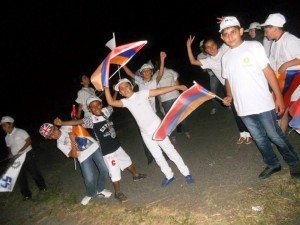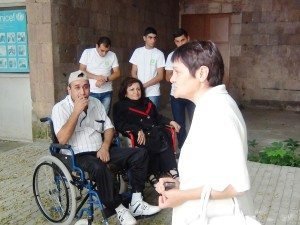YEREVAN (A.W.)–More than 4,000 NGO’s are reportedly registered in Armenia. The vast majority of these are dependent on external funding, either from local authorities or foreign entities, so much so that if outside channels were to be cut off, the vast majority would have to close up shop.

Indeed, it is not uncommon to hear civic groups—rightly or wrongly—referred to in Armenia as “grant eaters,” a reference to their appetite for outside money. This characterization also suggests that they lack a local base and focus more on chasing funds than on affecting real change.
But this summer, in the southern regions of Armenia, a new form of civic fundraising took shape. One that challenges these stereotypes head on.
Beginning in July, volunteers and staff at the Foundation Against the Violation of Law’s (FAVL) regional Civic Centers went into the streets and collected money directly from citizens around community concerns. This unprecedented move not only succeeded in raising funds to address local issues, but also served to mobilize citizens on a grassroots level.
The initiative was part of the Oxfam-sponsored “Achieving Active and Vibrant Citizenship through Empowerment of Civic Centers” program and was geared toward promoting self-sufficient forms of local activism.
“Oxfam continuously supports institutional and financial sustainability for the Civic Centers,” said Lilit Chitchyan, accountable governance program officer at Oxfam Armenia. “The centers are on their way to becoming self-sustainable, so they can better empower grassroots groups to advocate for their needs and improve local governance.“

As a staff member at FAVL, I got a chance to personally see people in the regions of Vayots Dzor and Syunik give from their own pockets to make a change in their communities.
In Sisian, a vital 700-meter road leading into the rural community of Torunik was completely renovated thanks to donations made by residents at an outdoor fundraiser, which featured singing, poetry, and student performances. Three weeks later, the Yeghegnadzor Civic Center held a talent show dedicated to assisting disabled residents in the city. The event’s financial target was surpassed, with money raised both through ticket sales and donations. Wheelchair ramps are currently being built in key public areas as a result.
More than 20 volunteers turned out in the neighboring city of Vayk, where they set up a booth at a public concert and succeeded in raising 220,000 AMD ($541) in personal contributions. The money was used one week ago to erect 15 trashcans on Shahumyan Street, a main road in the city.
Further south, members of the FAVL Kapan Civic Center organized a benefit chess tournament for youth in the village of Geghanoush. Under the slogan, “Together We Can Do More,” they helped raise money to set up trash-free zones in the rural community.
In almost every case, the organizers raised more money than they had targeted. This money came from average citizens, not wealthy benefactors or outside entities. In addition, commissions of local NGO’s, government officials, and concerned residents were formed to transparently allocate the funds for each project.
Despite the fact that the fundraisers were for things that the government should already be providing—roads, wheelchair ramps, trash cans, etc.—it was inspiring to see residents coming together to fill the voids where the state has failed.
“I am very happy and proud of the fact that there are people who genuinely understand and want to help us,” said Ashkhen Margaryan, a second degree disabled resident of Yeghegnadzor. “That talent show once again reminded the public and government about the absence of wheelchair ramps and their vital necessity.”
The experience was a powerful one for both organizers and participants, who invested in a grassroots initiative and saw the results first-hand. They realized that by giving their time, energy, and money, they could make a positive impact on their daily lives.
“This form of fundraising has never really been seen before in Armenia,” explained Kristina Gevorkyan, vice-president of FAVL. “Many were doubtful that average citizens, especially in the poorer south, would give to such campaigns. But the people have proven them wrong.”
I must admit that I myself was among those who were doubtful, at first. But this initiative rekindled my faith in the power of mobilizing around a common cause. Recent developments in Armenia have shown that real victories can be achieved when movements are independent and popularly based. Working from the bottom up helps build strength and public consciousness that is simply irreplaceable. It is through such local strength that civil society can be truly self-sufficient and active on the issues that matter most.
The more citizens join together for such coordinated action, the more we will see a healthy civil society capable of tackling problems and affecting decision-making on a local level.


sure we would all like help to correct all short commings in are personal life and of course tobring armenia up to levels of developed nations. however, i’ beginning to suspect that the problems in armenia are being exploited by outside forces just as they are in middle east countries and by the same tactics. never let a crisis go to waste i believe is the tactic behind this latest facade. there is only one pie to cut into wedges by any government whose apex concern is to keep its country safe ,whole and independent.the more wedges cut from the whole pie leaves smaller and smaller wedges used to feed the necessary funding for that purpose. I have come to believe that highly skilled forces outside armenian spheres are manipulating the most vulnerable citizens to uprise and ultimately overthrough the government. if armenian parties inside and outside armenia want a free and unfettered republic they must await there turn and run for election meanwhile all citizens os armenia and outside do_gooders should do all tofortify the country not tobreakit down by encouraging negative and unwholesome demonstrations. do not think i am saying the needs of any group or persons are false. i do believe needs are there and real. there must be proper governmental channels to follow.If oxfam and human rights and amnesty international are sincere in standing up for the citizens os armenia why don’t they try to get funding for armenia’s needs? the last time i checked funding for armenia was being cut again.Why is there always unlimited funding for Israel?President Obama himself knows that
Thank you Mr. Aprahamian for relating such a heart-warming story.
Yes we can do it! Yes we can be motivated to do it.
I will call this ‘people empowerment’, We do not have to wait for ‘the government’ to do everything.
During the training for our volunteering year (2002) we had the chance to hear Dr. Armen Gakavian of Australia, who delivered a paper on ‘social mobilisation’. If anyone wants a copy, I have one, or you can contact Dr. Gakavian.
We may not succeed all the time, but when we do…
I agree with Antoine: this is a great story and an excellent strategy on so many fronts. It recruits not just the gift, but also the giver. It challenges the idea that change will come from ‘somewhere else’. And, as your article points out, it challenges the dependency on international funding.
More power to you all.